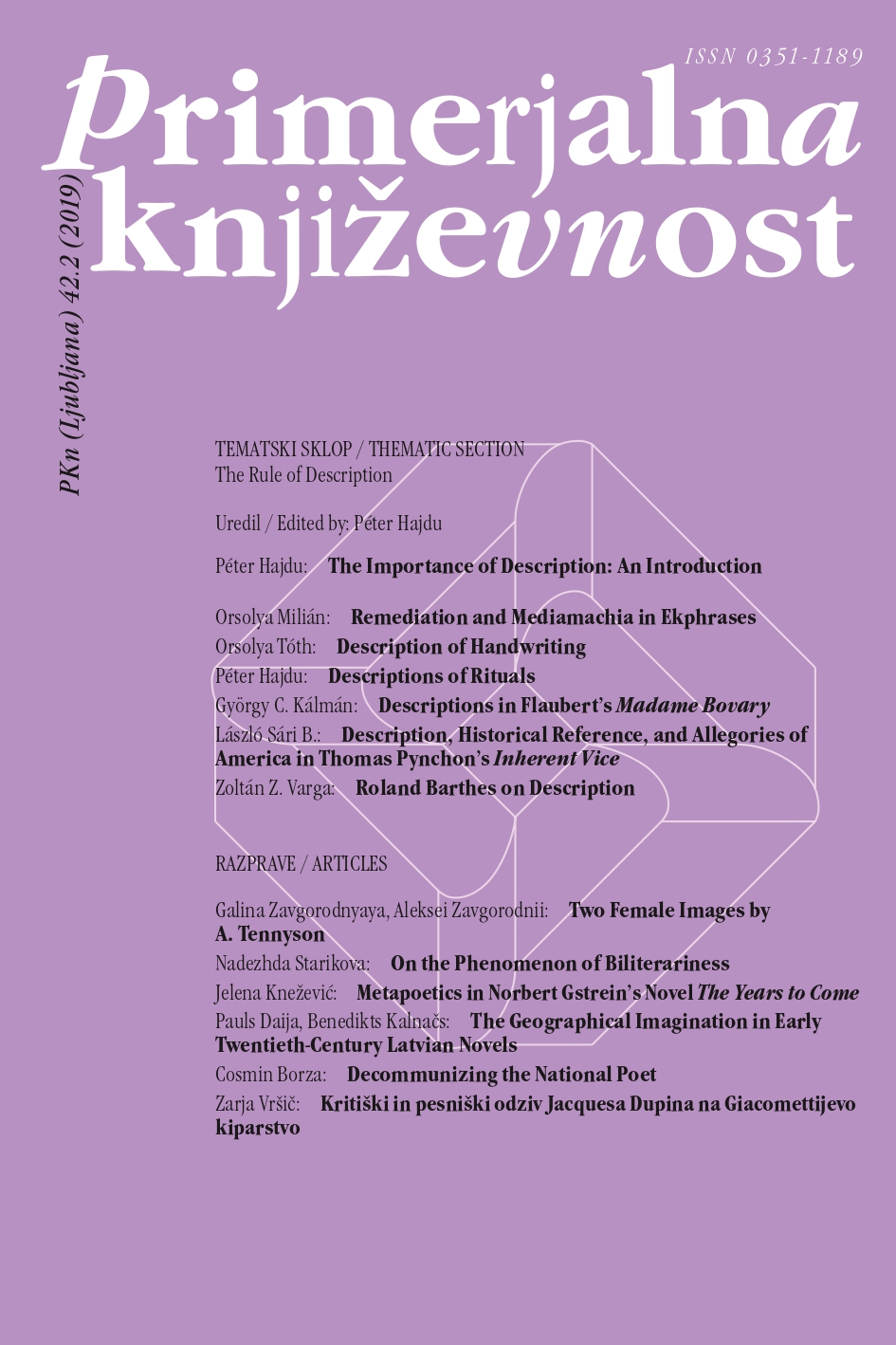Remediation and Mediamachia in Ekphrases
Keywords:
intermediality, literature and visual arts, poetry, image description, ekphrasis, Williams, William Carlos, Kranz, Gisbert, Brueghel, Pieter the ElderAbstract
Remediation as conceived by Jay David Bolter and Richard Grusin designates a kind of intermedial relationship in which various media may refashion or appropriate, pay homage to or rival one another. Taking as example the literary form of ekphrasis, understood in its narrower sense as the literary description of a visual work of art, this article examines ekphrasis as a technique of remediation. Following Bolter and Grusin’s understanding of remediation and W. J. T. Mitchell’s analysis of the text-image dialectic, this article aims at outlining the traits of the paragonal struggle (that is mediamachia) between word/text and image in “The Parable of the Blind” by William Carlos Williams and “Der Blindensturz” by Gisbert Kranz. Firstly, it establishes a theoretical framework within which the differentiation of ekphrasis as a strategy of verbal hypermediacy becomes possible. Secondly, it presents a comparative analysis of the above mentioned poems, showing that while Williams’s poem effaces the visual (Brueghel’s The Parable of the Blind) keeping its traits in verbal allusions only, and in a sense repressing the image in order to create its own verbal “self-portrait”, Kranz’s poem adds another stratum to the mediatization of Brueghel’s painting through verbal description, namely the typographic image of the verbal text which exhibits the “skeleton” of the original pictorial composition as well. Thus, Kranz’s poem might be considered as a form of multiplied hypermediacy. As opposed to Williams’s more conventional ekphrasis, Kranz also rearranges the traditional word-image hierarchy of ekphrases (that tend to give supremacy to words) in that it vindicates a more “democratic” or balanced relation between the verbal and the visual medium.
References
Baker, A. D. The Act of Seeing: Poem, Image and the Work of William Carlos Williams. Doctoral Thesis, 1982. Durham University. Durham E-Theses Online (etheses.dur.ac.uk). Web. 24 Oct. 2018.
Bolter, Jay David, and Richard Grusin. Remediation. Understanding New Media. Cambridge, MA: The MIT Press, 1999.
Bolter, Jay. “Transference and Transparency: Digital Technology and the Remediation of Cinema.” Intermédialités 6 (2005): 13−26.
Bruhn, Siglind. Musical Ekphrasis. Composers Responding to Poetry and Painting. Hillsdale, New York: Pendragon Press, 2000.
Elsner, Jaś. “Seeing and Saying: A Psychoanalytic Account of Ekphrasis.” Helios 31.1–2 (2004): 157−186.
Hagen, Rose-Marie, and Rainer Hagen. What Great Paintings Say. Vol. 2. Köln: Taschen, 2003.
Heffernan, James A. W. Museum of Words. The Poetics of Ekphrasis from Homer to Ashbery. Chicago and London: The University of Chicago Press, 1993.
Imdahl, Max. Giotto. Arénafreskók. Transl. Kerekes Amália. Budapest: Kijárat Kiadó, 2003.
Kibédi Varga, Áron. “Critera for Describing Word-and-Image Relations.” Poetics Today 10 (1989): 31−53.
Kranz, Gisbert, ed. Das Bildgedicht. Theorie, Lexikon, Bibliographie. Vol. I. Köln and Wien: Böhlau Verlag, 1981.
Kranz, Gisbert. Niederwald und andere Gedichte. Lüdenscheid: Verlag Michael Claren, 1984.
Krieger, Murray. Ekphrasis. The Illusion of the Natural Sign. Baltimore: The Johns Hopkins University Press, 1992.
Kukla Krisztián: “Okuláris okulás. (Id. Pieter Bruegel Vakok című festményének interpretációi).” Web. 27 Oct. 2018. <http://www.c3.hu/~gond/tartalom/18-19/frakukla.html>.
McLuhan, Marshall. Understanding Media. The New Extensions of Man. London and New York: Routledge, 2001.
Milián Orsolya. Az ekphraszisz fikciói. Elméleti, történeti és diszciplináris átrendeződések az ekphraszisz teoretikus diszkurzusaiban. Doctoral Thesis, 2010. University of Szeged, Repository of Dissertations (doktori.bibl.u-szeged.hu). Web. 22 Oct. 2018.
Mitchell, W. J. T. Picture Theory. Essays on Verbal and Visual Representation. Chicago and London: University of Chicago Press, 1994.
Stewart, Garrett. “Bookwork as Demediation.” Critical Inquiry 36.2 (2010): 410−457.
Sullivan, Margaret A. “Peasant and Nestrobber: Bruegel as Witness of His Times.” Journal of Historians of Netherlandish Art 7.2 (2015). Web. 28 Oct. 2018.
Williams, William Carlos. Pictures from Brueghel and Other Poems. New York: New Directions, 1962.
– – –. “The Parable of the Blind.” Web. 20 Oct. 2018. <http://english.emory.edu/classes/paintings&poems/blind.html>.


